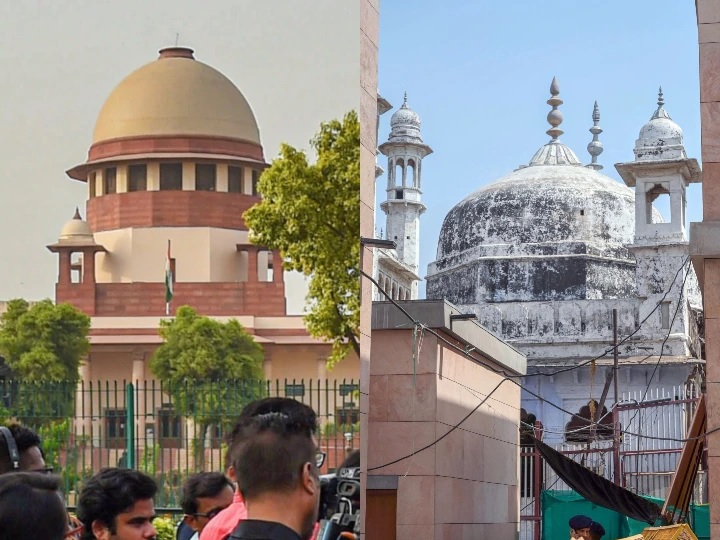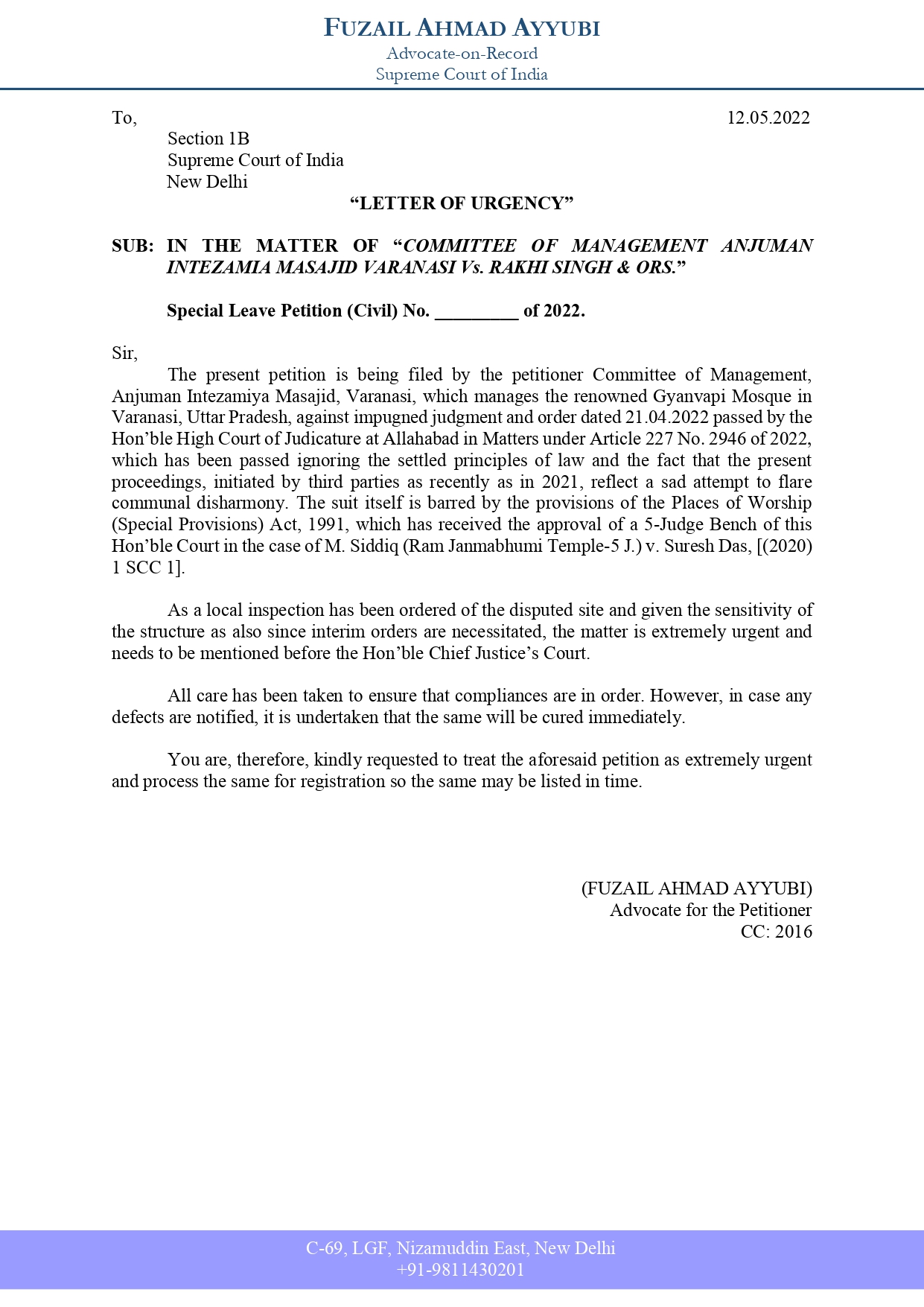
On May 17, 2022, the Supreme Court ordered to protect the area where the Shivling was found at Varanasi’s Gyanvapi mosque, without impeding Muslims’ right to enter the mosque and pray. This is a significant change from the restriction previously imposed by the lower court in Varanasi.
A Supreme Court bench comprising Justices DY Chandrachud and PS Narasimha was hearing the appeal filed by Committee of Management of Anjuman Intezamia Masjid (AIM), the committee that manages the Gyanvapi mosque, challenging the Allahabad High Court order which permitted a court commissioner appointed by Varanasi court (Civil court) to inspect, conduct survey and videography, the Gyanvapi mosque. The mosque is built adjacent to the Kashi Vishwanath temple and has been part of a dispute where a variety of petitions have been filed against the mosque, demands ranging from return of the land upon which the mosque is built to permission to offer prayers at a temple located in the mosque premises.
The bench has issued notice on the petition and has listed the matter to be heard on May 19, 2022.
An urgent listing for the petition had been sought by the petitioner on May 13, 2022 citing reasons that a local inspection had been ordered of the disputed site and so interim orders are necessitated given the sensitivity of the structure. As per the letter of urgency, the Allahabad High Court’s order had been passed ignoring the settled principles of law and the fact that the present proceedings, initiated by third parties as recently as in 2021, reflects a sad attempt to flare communal disharmony.

Senior Counsel Huzefa Ahmadi appearing for the appellant reportedly argued, “Despite this matter being seized of by this court, the commission went. Despite the fact no report was filed, application by plaintiff said there was a Shivling somewhere near the pond, this was highly improper. Such proceedings had to be confidential. Trial court allows the application and sealed off the area prohibiting entry. We brought this into record by an interim application.”
He further submitted, “Please see the manner in which order is passed. It is passed when the parties are there for execution of the commission. And on whose say? Not on the report of the Commission. On an application by plaintiff. Does it not show some element of lack of fairness.”
LiveLaw reported that the impugned order was passed in a suit for worship filed by Hindu devotees. The Masjid Committee had opposed the suit by filing an application for rejection under Order 7 Rule 11, on the ground that both the suits filed in 1991 and 2021 are barred by the provisions of Places of Worship (Special Provisions) Act, 1991. Reliance was placed on Supreme Court orders which categorically held that the religious character of a place as on August 15, 1 947 cannot be tinkered.
Counsel Ahmadi raised his contention that all the orders passed by the Varanasi court go against the Supreme Court judgment in the M Siddique case (Ram Janmabhumi Temple-5 J.) v. Suresh Das, [(2020)1 SCC 1] and the Ayodhya verdict. He was quoted saying, “It says you cannot tinker the places of worship as existing on August 15, 1949. This is suspect to great mischief.”
The Court reportedly responded, “We will issue a direction to the trial judge to dispose of the application under Order 7 Rule 11 CPC. The basis of your challenge today which is that grant of such reliefs is precluded by the 1991 Act is also the basis of order 7 rule 11 application be decided. So, the grievance is that. We direct trial court to dispose it off.”
Additionally, seeking a stay on the impugned orders he further argued, “What I am also seeking is a stay of all these orders. These orders are not good on ground of jurisdiction. These orders whereby the commission etc have been appointed must come to a standstill. The status quo as it existed on date of suit should be maintained. All orders are illegal.”
As the Court decided to strike a balance between and decided to uplift the restrictions on Muslims to worship in the mosque, Solicitor General Tushar Mehta appearing for the State of Uttar Pradesh reportedly submitted, “The area where Shivling is found, it should be protected, suppose someone goes there are touches with feet, there will be law and order problem.”
Earlier during the day, the court of the Civil Judge (Senior Division) removed Ajay Kumar Mishra as one of the Advocate Commissioners tasked to conduct a video survey of the Gyanvapi mosque. This is the same Advocate Commissioner that the Anjuman Intezamia Masjid (AIM) had claimed was biased and sought removal of last week.
The three Advocate Commissioners were to submit the survey report today. LiveLaw reported that the third Advocate Commissioner Vishal Singh moved an application before the court seeking two more days to include all facts in the report. Interestingly, the petitioners also moved an application to conduct a new survey of the premises. They want a survey of the wall that stands to the north of the Shivling and the basement area facing the statue of Nandi.
The court granted a two-day extension for submitting the report. Findings of the report were not to be made public until they were submitted to the court. But in light of the Shivling controversy, where an advocate representing the Hindu petitioners claimed a Shivling had been found in the Wazu Khana of the mosque that led the court to order that the area be sealed on Monday, today the court removed Advocate Commissioner Ajay Kumar Mishra for leaking information to the media.
Brief background of the case
The Gyanvapi mosque has been in the eye of the storm as it was built after Mughal Emperor Aurangzeb razed a portion of the Kashi Vishwanath temple, many claim that the mosque was built using the temple’s debris. Hardline Hindutva groups, feeling particularly empowered in wake of the Ayodhya dispute verdict, have been demanding that the mosque land be given back to the temple authorities. A slew of petitions has been filed over the last two years.
One such petition was filed in August 2021, five women, one of whom has since withdrawn her name from the case. They had moved the Civil Court (Senior Division), demanding that the Maa Shringar Gauri Temple be reopened, and people be allowed to offer prayers before the idols that are still kept there. The petitioners cited the right to practice one’s faith and religious freedom guaranteed by Article 25 of the Constitution.
On April 8, 2022, Civil Judge (Senior Division), Varanasi, Ravi Kumar Diwakar had appointed Advocate Commissioner Ajai Kumar to carry out the survey and asked him to submit a report at the next hearing on May 10. It is noteworthy that this is distinct from the survey by the Archeological Survey of India (ASI), as that was stayed by the Allahabad High Court. The authorities began conducting the video survey on May 5.
But the Anjuman Intezamia Masjid (AIM), which is the mosque management authority, opposed this and moved court. However, their petition against the survey was dismissed by the Allahabad High Court on April 21. The lower court in Varanasi, on April 26, then again passed an order to carry out the survey, though now it appears that there was some ambiguity about where the survey could be conducted, specifically if it could be conducted inside the temple that is located on mosque land that is a Wakf property. The mosque authorities raised concerns as they claim this violates the principle of non-retrogression under the Places of Worship Act. But the petitioners say the same law would be applicable if it is discovered that there was originally a temple on the mosque and therefore the survey is important.
The AIM opposed videography inside the mosque and also alleged that Advocate Commissioner Ajay Kumar was “biased”. They moved court again on May 7. Hearings took place on May 10 and 11 following which the court ordered on May 12 that while it will not replace or remove Ajay Kumar as Advocate Commissioner, it will appoint two more Advocate Commissioners to conduct the survey and submit a report by May 17. The court said, “The survey will be conducted in Gyanvapi mosque and the entire barricaded area. Authorities will photograph and videograph the area. District authorities are ordered to open/break the lock of the basement and allow videography there as well.”
The survey ended on Monday, May 16, when the Shivling controversy broke out. An advocate representing the Hindu petitioners in the case moved an application before the court of the Civil Judge (Senior Division) saying that a Shivling, a stone sculpture considered holy by Hindus, was discovered on the premises. Responding to the application, the judge immediately ordered the area sealed.
While advocate Vishnu Jain claimed the Shivling was found in a well, another advocate Madan Mohan Yadav claimed it was facing Nandi (a statue of a holy cow). Details of the survey’s findings were to be submitted to the court by May 17 and have not been made public so far. In fact, when India Today probed the videographer, he simply said that he was not allowed to divulge any details.
The Indian Express quoted an excerpt of the order passed by Judge Ravi Kumar Diwakar as saying, “District Magistrate, Varanasi, is directed to immediately seal the place where the Shivling has been found. No person should be allowed to enter the place which will be sealed. The responsibility for the security and custodianship of the place which will be sealed will be considered personally of Varanasi district magistrate, Varanasi police commissioner and the CRPF commandant, Varanasi.”
Responsibility was placed on the Director General of Police (DGP) of Uttar Pradesh, and the Chief Secretary of the state to supervise the sealing.
Meanwhile, the Anjuman Intezamia Masjid (AIM), which is the mosque management authority, moved the Supreme Court demanding a stay on the survey and other orders that they say are in violation of the Places of Worship Act, according to which, the character of a religious structure cannot be altered from what it was on August 15, 1947.
Related:
Shivling ‘found’ on Gyanvapi mosque premises, court orders area sealed
Gyanvapi case: Two more advocate commissioners added to Shringar Gauri survey team
Gyanvapi case: Court to pronounce order in Shringar Gauri temple survey matter today
Gyanvapi case: One out of five withdrawing name from Maa Shringar Gauri temple petition?
Gyanvapi case: Videographic survey of Maa Shringar Gauri temple begins
Gyanvapi case: Allahabad HC stays ASI survey, proceedings before lower court
Gyanvapi case: Varanasi court to hear petition to hold prayers in Shringar Gauri temple